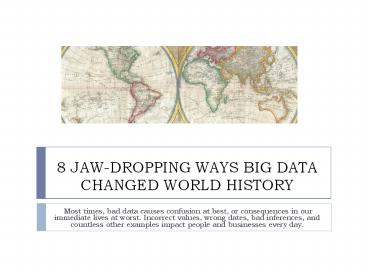8 JAW-DROPPING WAYS BIG DATA CHANGED WORLD HISTORY - PowerPoint PPT Presentation
Title:
8 JAW-DROPPING WAYS BIG DATA CHANGED WORLD HISTORY
Description:
You’ve made the big decision: you want to move to a cloud data warehouse. We see this every day. Your on-premise data warehouse is too expensive, inflexible, and difficult to maintain. Meanwhile, cloud data warehouses store, manipulate, and analyze massive amounts of data in a more efficient, scalable, and cost-effective way. – PowerPoint PPT presentation
Number of Views:22
Title: 8 JAW-DROPPING WAYS BIG DATA CHANGED WORLD HISTORY
1
8 JAW-DROPPING WAYS Big DATA CHANGED WORLD
HISTORY
- Most times, bad data causes confusion at best,
or consequences in our immediate lives at worst.
Incorrect values, wrong dates, bad inferences,
and countless other examples impact people and
businesses every day.
2
8 JAW-DROPPING WAYS Big DATA CHANGED WORLD
HISTORY
- However, every so often, bad data does much
more than create a mundane problem. When bad data
becomes the focal point in an event with global
ramifications, the course of world history can
change. - Here are 8 jaw-dropping ways bad data
changed world history - Chinas Disrupted Search for Rome
- In 97 AD, Chinese military ambassador Gan
Ying was sent on an expedition by Chinese general
Ban Chao to travel to the Roman Empire. But Gan
Ying never reached Rome. He travelled as far as
modern day Iran, and asked local merchants how
long it took to cross the Black Sea to Rome.
Wanting to preserve their trading monopolies, the
merchants provided Ying with bad data, saying the
trip could take up to 2 years. This was too long
a wait, so Ying turned back, and China never
connected with the Roman Empire.
3
8 JAW-DROPPING WAYS Big DATA CHANGED WORLD
HISTORY
- Harald Sigurdsson, King of Norway, invaded
England in 1066. After initial blistering
victories, Haralds army decamped in the defeated
town of Fulford. Haralds reconnaissance team
concluded that English troops were nowhere near
the town. The team passed this bad data onto
Harald, who ordered his men to remove their armor
and rest. Then English troops surprised the
vulnerable invaders, routed the army, and killed
Harald in battle, forcing Norways retreat from
England. - In 1492, Christopher Columbus sailed
across the Atlantic Ocean to find an alternative
route to Asia. But Columbus relied on the
inferior calculation of Alfranagus, a Persian
geographer, to chart his route. Furthermore,
Columbus either forgot or did not realize that he
had to convert the Arabic miles used by
Alfranagus into Roman miles. This bad data caused
Columbus and his crew to land in the Americas,
rather than in Asia.
4
8 JAW-DROPPING WAYS Big DATA CHANGED WORLD
HISTORY
- For centuries, miasma theory held that
diseases were transmitted by poisonous vapors or
mists that contained decomposed matter, rather
than by microbes. The theory was used to treat
all of Europes major plagues. Miasma theory
called for medical treatments that eliminated
poor smells and bad hygiene. Since scientists had
no instruments for measuring real success, they
interpreted mild improvements amongst patients as
confirmatory data for the theory. Miasma theory,
and all the bad data associated with it, blocked
physicians from properly treating patients all
the way into the 20th century. - During World War II, the Germans created the
first long-range guided ballistic missile, known
as the V-2. The V-2 allowed the Germans to hit
Allied targets accurately and rapidly over very
long distances. However, a misinformation
campaign led by British double agents convinced
the Germans that the missiles were off by 10 20
miles. The Germans adjusted the missiles based on
this bad data, and ended up mostly hitting the
sparse areas outside of London.
5
8 JAW-DROPPING WAYS Big DATA CHANGED WORLD
HISTORY
- By 1971, resistance to Americas war in
Vietnam was growing quickly. But there was still
a large portion of the country that supported the
effort. When the Pentagon Papers were leaked to
the New York Times, it became clear that most of
the data the US government released about the
conflict was false. Without this smokescreen of
bad data, support for the war plunged across the
American public. - For the 8 JAW-DROPPING WAYS BIG DATA
CHANGED WORLD HISTORY
6
8 JAW-DROPPING WAYS Big DATA CHANGED WORLD HISTORY
- The Mars Climate Orbiter was a NASA space
probe launched in 1998 to study the Martian
climate. The probe was expected to generate major
breakthroughs, and the scientific community
across the world was eagerly awaiting the
results. But the Orbiter never performed a single
test. The probe flew off track and disintegrated
in the atmosphere of Mars because its software
was not converting data to the metric system. The
bad data may have been a 6th grade science
problem, but it led to a 193 million dollar
mistake. - 2008 World Financial Meltdown (2008)
- As one of the worst financial crises in
history, the 2008 crash was fueled by bad data
that overstated how much mortgage-backed
securities, collateralized debt obligations, and
other derivatives were actually worth. When the
subprime mortgages that formed these derivatives
defaulted, and their true value became apparent,
key financial institutions such as Lehman
Brothers went bankrupt. The collapse led to
widespread evictions, foreclosures, and job
losses across the world.
7
8 JAW-DROPPING WAYS Big DATA CHANGED WORLD HISTORY
- Maybe Thats Why Data Quality is So
Important? - Not every instance of bad data is going to
generate a world altering event. But it is
interesting to reflect on how the data we use
every day could ever become so randomly
consequential. Most of us will never discover a
country, or win a war, but we can certainly try
our best to make sure that the data we handle and
produce is of a high quality.































